Is #MeSnooze a hashtag? It could well be for those who sat through the 90th annual Academy Awards, an Oscar night so reined in by the current climate in Hollywood that it was as if all the fun and frolics had been leached out of a ceremony always at its best when it lets in a teensy bit of the lowbrow, or at least allows for the unexpected.
The unpredictable was certainly the case last year. The Best Picture cock-up (the so-called Envelopegate) wasn’t going to happen twice in a row, even if Warren Beatty and Faye Dunaway were invited back to do the honours: “Presenting is lovelier the second time around,” Dunaway deadpanned. Indeed, Guillermo del Toro rather sweetly checked to make sure that the card was accurate before stepping to the podium to give thanks for his film, The Shape of Water, winning Best Picture. The top prize was in this instance easily the most competitive of the night, with many expecting Three Billboards Outside Ebbing, Missouri or even Get Out to squeak in at the final moment. (The Shape of Water, which won four Oscars in all, was the evening's big winner, followed by Dunkirk with three, all in technical categories.)
By the point del Toro made the second of his two visits to the stage, a long evening (nearly four hours) had some while before run out of juice. Perhaps as if in understandable obedience to movements that hadn’t been named this time last year, Hollywood’s annual paean to itself has rarely seemed so muted. Sure, there was the offer of a jet ski for the presenter who gave the shortest speech (step up Mark Bridges, the costume designer for Phantom Thread), and host Jimmy Kimmel announced that he would time all the speeches instead of allowing the orchestra to drown them out: Bridges’ lasted 36 seconds.
But somewhere past the halfway mark, prolix winners were indeed given a musical prompt to hurry up. By that point, too, one had begun to notice that Kimmel often seemed strangely absent from his own second consecutive hosting gig, having promised at the end of last year never to come back. From an opening monologue comparatively light on comedy and thick with an earnest reminder of where the industry has got to now, one felt the evening all but buckling under the weight of having to toe the correct line. During one of his wanderings through the audience Kimmel asked Steven Spielberg if he had any pot. You wondered whether a collective toke might do everyone some good.
The very start – with contemporary faces folded into retro-style visuals in keeping with the Oscars’ nine decades – was a great idea given insufficient room or space to build: think how much Johnny Carson and Billy Crystal would have done with the same material. Or how much more relaxed such presenters as Tiffany Haddish (Girls Trip) and The Big Sick’s Kumail Nanjiani seemed in the face of #MeToo, #TimesUp and a newly enlightened climate that brought out the impassioned trio of Annabella Sciorra, Salma Hayek and Ashley Judd, three of the many women who have levelled allegations of sexual abuse at the producer Harvey Weinstein. (For the record Weinstein was namechecked during the show while Woody Allen and Kevin Spacey, among others, were not. Oh, and Mike Pence was, though Donald Trump wasn’t – at least directly. Lord knows how the Orange One feels about Mexican filmmakers winning the directing Oscar four out of the last five years: mandatory cheeseburgers for everyone, one fears.)
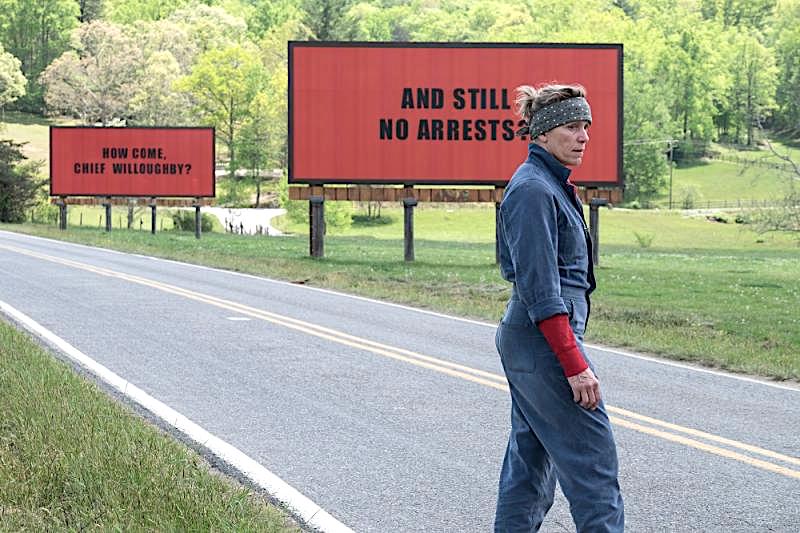 Even the redoubtable Frances McDormand (pictured above), kicking off with her now-familiar strategy at such events of informing us that she had “something to say”, closed out her Best Actress remarks with talk of an “inclusion rider” – an industry-speak reference that sent everyone scurrying to Google. Oh for the comparative brio and passion she brought to the stage when she won her first Oscar 21 years ago for Fargo: the rhetoric, or McDormand's delivery of it, is looking ever so slightly canned, though it was a nice touch when she encouraged all the female nominees in the auditorium to stand. Meryl Streep, with 21 nominations the prevailing female Oscar grandee, immediately led McDormand’s call, and the other women directly followed. (Streep, incidentally, now seems to occupy the prime position in a seat down-centre that for years went to her Ironweed co-star, Jack Nicholson.)
Even the redoubtable Frances McDormand (pictured above), kicking off with her now-familiar strategy at such events of informing us that she had “something to say”, closed out her Best Actress remarks with talk of an “inclusion rider” – an industry-speak reference that sent everyone scurrying to Google. Oh for the comparative brio and passion she brought to the stage when she won her first Oscar 21 years ago for Fargo: the rhetoric, or McDormand's delivery of it, is looking ever so slightly canned, though it was a nice touch when she encouraged all the female nominees in the auditorium to stand. Meryl Streep, with 21 nominations the prevailing female Oscar grandee, immediately led McDormand’s call, and the other women directly followed. (Streep, incidentally, now seems to occupy the prime position in a seat down-centre that for years went to her Ironweed co-star, Jack Nicholson.)
The roll call of winners was pro forma pretty well down the line: the trophies themselves were awarded across an array of films, with Lady Bird among the few that was entirely shut out. All four acting awards followed expected protocol, the Academy missing a golden opportunity to honour on the same night Gary Oldman (Darkest Hour) and the first of his five wives, Phantom Thread’s Lesley Manville.
And though the enthusiasm inside the Dolby Theatre for nominees Daniel Kaluuya (Get Out) and Timothee Chalamet (Call Me By Your Name) might have suggested an Adrien Brody-style upset, Oldman’s Winston Churchill once again prevailed, just as McDormand and Sam Rockwell did for Three Billboards and Alison Janney’s LaVona Golden (from I, Tonya) did for supporting actress. “I did it all by myself,” Janney said once she got to the stage, pausing for effect before issuing a correction: “Nothing could be further from the truth.” And though the self-seriousness of the evening seems to work against discussion of the nominees’ sartorial choices, Janney did look a lot more comfortable here than several weeks ago at the Baftas. Gone, thank heavens, was the collar ready to behead her at any second.
There were undeniable delights scattered here and there. It was wonderful to see the great Roger Deakins finally awarded for cinematography for Blade Runner 2049, his 14th nomination, just as one was heartened by the cheers for Mudbound’s Rachel Morrison – the first woman ever nominated in the cinematography category. The two British winners, themselves a couple, for live action short film for The Silent Child were eloquence and grace personified, and one can only assume that the subject of their film, six-year-old Maisie Sly, had some while before gone to bed.
Eva Marie Saint, who won an Oscar for On the Waterfront in 1955, at age 93 handled presenting chores with aplomb, and Broadway regular Keala Settle once again proved the undeniably galvanic power of best song nominee “This Is Me” from The Greatest Showman, which brought an ovation-happy audience once again to its feet. In context, the fact that the award actually went to “Remember Me” from Coco (a winner as well for animated film) remains a head-scratcher given that all four of the other song nominees came across better in performance. (Gael Garcia Bernal’s pitch troubles didn’t help the “Remember Me” cause.)
And to be honest, once all the appeals to inclusivity, immigrants, and a kinder, fairer Hollywood had quite sensibly and aptly been made, one still found oneself wishing for just a tiny bit of vulgarity or something truly lively that might at least knock at the door of the prevailing constraint. Del Toro – as gifted a speech-giver as the film industry has these days – got some of the way there in his buoyant shout-out to youth across society “showing us how things are done”. But I have a hunch there was a silent nod of assent when Oldman, paying tribute to his 98-year-old mum back in Britain, urged her to “put the kettle on”. By that point, we all could have used a drink.
Overleaf: the full Academy Awards results
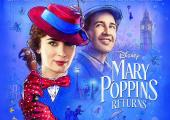


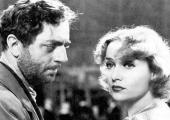


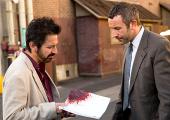

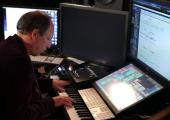
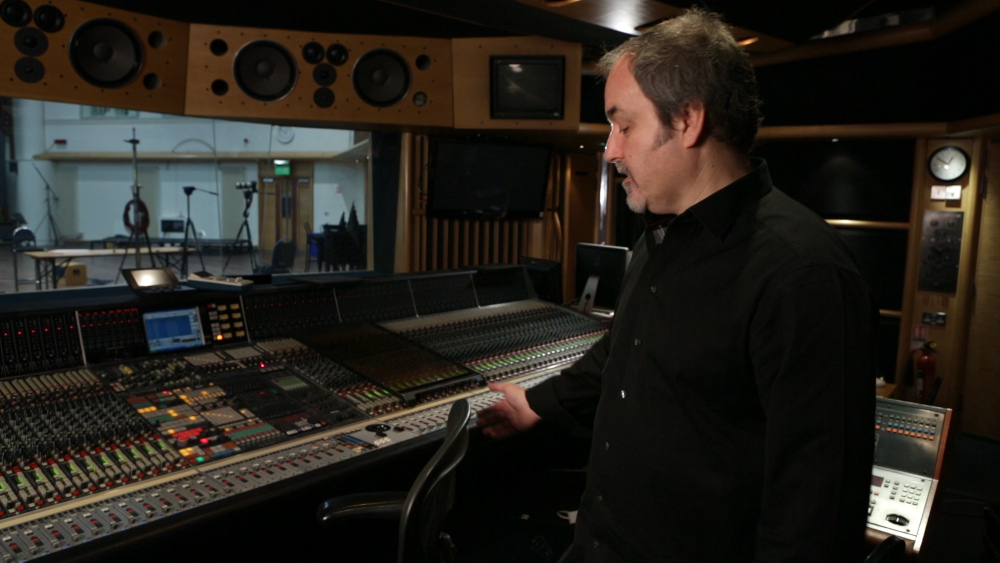 With his mass of interviews, too, Schrader seems determined to be scrupulously fair in giving speakers roughly equal air time – with the unfortunate result that several more minor figures spend quite a bit of time saying not much at all. Okay, he does focus on a handful of major composers for deeper exploration – John Williams, Jerry Goldsmith, Thomas Newman and Hans Zimmer – and Zimmer, in particular, is refreshingly candid in expressing his insecurities over where his next music will even come from. Disney executive Mitchell Lieb, too, seems caught off-guard when revealing that each of the company’s movies costing ‘close to half a billion dollars’ to make, with inevitable financial fallout for everyone involved – not least the composer.
With his mass of interviews, too, Schrader seems determined to be scrupulously fair in giving speakers roughly equal air time – with the unfortunate result that several more minor figures spend quite a bit of time saying not much at all. Okay, he does focus on a handful of major composers for deeper exploration – John Williams, Jerry Goldsmith, Thomas Newman and Hans Zimmer – and Zimmer, in particular, is refreshingly candid in expressing his insecurities over where his next music will even come from. Disney executive Mitchell Lieb, too, seems caught off-guard when revealing that each of the company’s movies costing ‘close to half a billion dollars’ to make, with inevitable financial fallout for everyone involved – not least the composer.
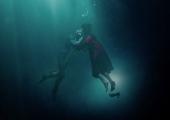
 Even the redoubtable Frances McDormand (pictured above), kicking off with her now-familiar strategy at such events of informing us that she had “something to say”, closed out her Best Actress remarks with talk of an “inclusion rider” – an industry-speak reference that sent everyone scurrying to Google. Oh for the comparative brio and passion she brought to the stage when she won her first Oscar 21 years ago for Fargo: the rhetoric, or McDormand's delivery of it, is looking ever so slightly canned, though it was a nice touch when she encouraged all the female nominees in the auditorium to stand. Meryl Streep, with 21 nominations the prevailing female Oscar grandee, immediately led McDormand’s call, and the other women directly followed. (Streep, incidentally, now seems to occupy the prime position in a seat down-centre that for years went to her Ironweed co-star, Jack Nicholson.)
Even the redoubtable Frances McDormand (pictured above), kicking off with her now-familiar strategy at such events of informing us that she had “something to say”, closed out her Best Actress remarks with talk of an “inclusion rider” – an industry-speak reference that sent everyone scurrying to Google. Oh for the comparative brio and passion she brought to the stage when she won her first Oscar 21 years ago for Fargo: the rhetoric, or McDormand's delivery of it, is looking ever so slightly canned, though it was a nice touch when she encouraged all the female nominees in the auditorium to stand. Meryl Streep, with 21 nominations the prevailing female Oscar grandee, immediately led McDormand’s call, and the other women directly followed. (Streep, incidentally, now seems to occupy the prime position in a seat down-centre that for years went to her Ironweed co-star, Jack Nicholson.)